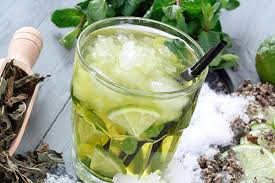Is Iced Tea Healthy to Drink?
Iced tea, a refreshing beverage enjoyed by many, often sparks a debate. Is it truly a healthy drink?
This article aims to shed light on the health benefits of iced tea. We’ll delve into its nutritional profile and potential drawbacks.
From antioxidants to caffeine content, we’ll explore it all. We’ll also touch on the role of herbal infusions in boosting the health quotient of this popular drink.

Understanding Iced Tea and Its Popularity
Iced tea, a chilled variant of the traditional hot tea, has gained immense popularity worldwide. It’s a versatile beverage that can be enjoyed in various flavors, from classic black or green tea to fruity infusions.
The appeal of iced tea lies not only in its refreshing taste but also in its potential health benefits. It’s often seen as a healthier alternative to sugary drinks, making it a favorite among health-conscious individuals.
However, the healthiness of iced tea can vary greatly. It depends on factors like the type of tea used, the preparation method, and the addition of sweeteners or other ingredients. We’ll delve into these aspects in the following sections.
The Nutritional Profile of Iced Tea
The nutritional profile of iced tea can vary depending on the type of tea used and the added ingredients. However, most iced teas share some common nutritional elements.
Primarily, iced tea is a rich source of antioxidants, particularly flavonoids. These compounds have been linked to a reduced risk of chronic diseases. Iced tea also contains trace amounts of minerals like manganese, essential for bone health.
Here are some key nutritional elements found in most iced teas:
- Antioxidants (flavonoids)
- Manganese
- Caffeine (in varying amounts)
- Polyphenols
- Vitamins (in some fortified versions)
Antioxidants and Their Role
Antioxidants play a crucial role in our health. They help neutralize harmful free radicals in the body, reducing oxidative stress.
The flavonoids in iced tea, a type of antioxidant, have been linked to anti-inflammatory properties and a reduced risk of chronic diseases.
Caffeine Content: Pros and Cons
Most iced teas contain caffeine, though the amount can vary. The caffeine in iced tea can provide a mild stimulant effect, boosting alertness and concentration.
However, it’s important to consider caffeine sensitivity. Some people may experience restlessness or disrupted sleep patterns if they consume iced tea later in the day.
Iced Tea Health Benefits
Iced tea offers a range of health benefits, making it more than just a refreshing beverage. These benefits can vary depending on the type of tea used and the preparation method.

Here are some key health benefits associated with regular, moderate consumption of iced tea:
- Hydration and refreshment
- Metabolic boost and weight management
- Cardiovascular health
- Bone strength and dental health
Hydration and Refreshment
Iced tea can contribute to your daily hydration needs. It’s a refreshing, low-calorie alternative to sugary drinks, especially during hot weather or after exercise.
Moreover, the water content in iced tea aids in maintaining body temperature, supporting digestion, and helping transport nutrients.
Metabolic Boost and Weight Management
Certain types of iced tea, particularly those made from green tea, can boost metabolism. This can aid in weight management and fat burning.
Additionally, iced tea can be a satisfying, low-calorie beverage that helps control calorie intake, supporting weight loss efforts.
Cardiovascular Health
Some studies suggest that the antioxidants in iced tea can improve cardiovascular health. They may help reduce blood pressure and lower the risk of heart disease.
Flavonoids in tea can also help improve blood vessel function, promoting heart health.
Bone Strength and Dental Health
Iced tea can be a good source of manganese, a mineral important for bone health. Regular consumption can contribute to maintaining bone strength.
As for dental health, while tea can stain teeth over time, it also contains compounds that fight bacteria in the mouth, promoting oral health.
Herbal Infusions as a Healthy Twist
Herbal infusions can add a healthy twist to your iced tea. These infusions often contain herbs like chamomile or peppermint, which can have calming effects.

Popular Herbal Iced Teas and Their Benefits
Iced tea made with hibiscus is a popular choice. It’s known to help lower blood pressure and has a tangy, refreshing flavor.
Another popular herbal iced tea is made with rooibos. This South African herb is caffeine-free and packed with antioxidants, making it a healthy and flavorful choice for iced tea.
Potential Drawbacks of Iced Tea
While iced tea has many health benefits, it’s not without potential drawbacks. One of the main concerns is the sugar content in commercially prepared iced teas.
Overconsumption of iced tea can also lead to negative health effects. For instance, high oxalate content in some teas can lead to kidney stones if consumed excessively.
Sugar Content and Alternatives
Many commercially prepared iced teas are high in sugar. This can lead to weight gain and other health issues if consumed in large amounts.
However, you can control the sugar content by making your own iced tea. Consider using natural sweeteners like honey or stevia to enhance the flavor without adding too many calories.
Caffeine Sensitivity and Sleep
Iced tea, especially when made from black or green tea, contains caffeine. While this can provide a mild stimulant effect, it can also disrupt sleep, especially if consumed late in the day.
For those sensitive to caffeine, decaffeinated options are available. Herbal iced teas are also a great caffeine-free alternative.
Making the Healthiest Choice: Tips for Iced Tea Lovers
Choosing the healthiest iced tea involves more than just picking a flavor. It’s about understanding the ingredients and how they impact your health.
For instance, homemade iced tea allows for control over the ingredients and sugar levels. You can also choose high-quality tea leaves and infuse your iced tea with fruits and herbs for additional health benefits.
Here are some tips for making the healthiest iced tea:
- Opt for unsweetened or naturally sweetened iced tea to avoid excess sugar.
- Choose high-quality tea leaves for the best health benefits.
- Infuse your iced tea with fruits and herbs for added flavor and health benefits.
- If you’re sensitive to caffeine, consider decaffeinated or herbal iced tea options.
- Remember to consume iced tea in moderation to avoid potential negative health effects.
Conclusion: Balancing Enjoyment and Health
In conclusion, iced tea can be a healthy and refreshing beverage when consumed in moderation. It offers numerous health benefits, from hydration to potential disease prevention. However, it’s important to be mindful of the ingredients, especially the sugar content. Ultimately, balancing enjoyment and health is key to making the most of iced tea benefits.

